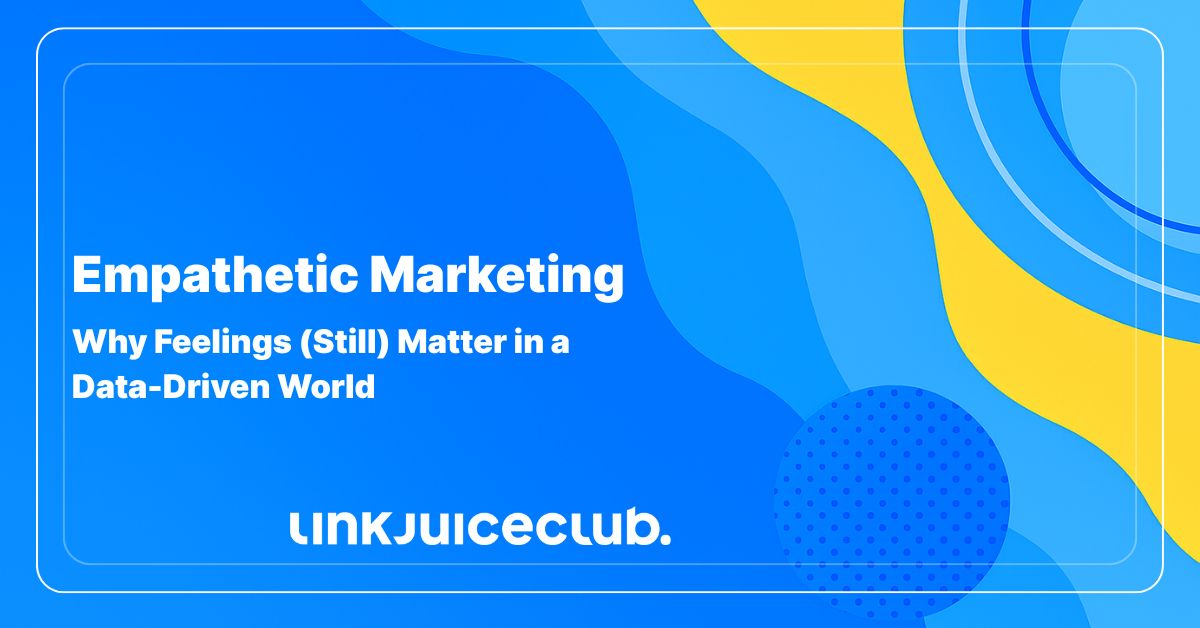
Empathetic Marketing: Why Feelings (Still) Matter in a Data-Driven World
We live and breathe data.
We crunch it, chart it, and build entire campaigns around it. From pinpointing user behavior to personalizing customer journeys, data is the engine behind most modern marketing.
But all that insight doesn’t mean much if your audience doesn’t feel something.
That’s where empathetic marketing comes in. Because while data can predict what people do, empathy helps you understand why they do it (and that’s where real connection begins). 🔗
Emotion Still Runs the Show!🌹
Consumer behavior is about alignment. People want to support brands that get them. Their values have shifted, their expectations have grown… and marketing that fails to connect emotionally just fades into the background noise.
That’s why successful marketers aren’t just tracking clicks; they’re tuning into emotions. To truly resonate with your audience, you need to speak to their reality. And that means making empathy the backbone of your strategy.

But before you can master it, you need to understand what empathy really means (and what it doesn’t).
Sympathy ≠ Empathy (This Is Important to Remember)
It’s easy to confuse empathy with sympathy, but they’re not the same.
Sympathy is recognizing someone’s pain from the outside. It’s saying: That’s awful, I’m sorry you’re going through that, without really stepping into their experience. It’s a passive concern. It’s distant!
Empathy, on the other hand, is immersive. It means stepping into someone else’s shoes, seeing the world through their eyes, and feeling what they feel, even if you’ve never been through the same thing.
That’s why empathetic marketing works. It moves beyond basic demographic targeting and instead asks:
- What’s actually going on in users’ lives right now?
- What do they care about?
- What’s stressing them out?
- What brings them joy?
And when you truly understand your audience, your messaging becomes special. It becomes relatable. It becomes memorable. And most importantly, it becomes trusted.
Empathy Isn’t Just Nice – It’s Necessary
People make decisions based on emotion more than logic. You can have the best product in the world, but if your message doesn’t land emotionally? It won’t stick.
Empathy forces us to step out of our marketing bubble. It keeps us from creating content that’s based on our assumptions, because what we think is clever or cool might totally miss the mark for the audience we’re trying to reach.
In short: no emotion, no action. 🚫
Are You Really an Empathetic Marketer?
Most marketers think they know their audience. Most marketers are also wrong!
A lot of them are convinced they’re naturally empathetic. But when it comes time to predict how real people will respond to their messaging? They miss the mark… badly. Why? Because they’re projecting their own opinions, preferences, and assumptions onto the audience.
It’s not that they don’t care; it’s that they’re seeing through the wrong lens.
The truth is, you can’t create emotionally resonant content without a healthy dose of self-awareness. Your personal taste isn’t a reliable compass. If you’re not actively checking for bias, you’re not marketing to your audience.
Real empathetic marketing means stepping back, asking better questions, and actually listening to the people you’re trying to reach. Not just imagining what they might want, but tuning in to what they’re really saying.
Let’s Be Honest: Empathetic Marketing Really Works
People are tired of brands that shout into the void and hope someone hears them. So, instead of pushing, empathetic marketing connects.
Trust: The Currency You Can’t Fake
This type of marketing gives your brand a human face. When you show customers you understand their doubts, their hesitations, and their post-purchase did I just mess up? moments, they stick around.
Why? Because you’re treating them like a relationship. Skip the empathy, and you risk becoming forgettable. Worse? Replaceable.
If You Want to Be Heard, Show You Care
Your customers don’t care about your achievements. They care about solving their own problems. And until you show them you get those problems, they’ll keep scrolling.
So, empathetic marketing is important because it talks to your customers, not at them. It proves that you’ve done your homework, and you actually care about their experience, not just your bottom line.
Once they feel seen, they’ll be ready to hear what you have to offer.
Human at Every Touchpoint
The modern buyer’s journey is a bit of a maze, especially in B2B. Multiple stages, multiple decision-makers, and way too many tabs open. But here’s the secret: every touchpoint is a golden opportunity to connect.
Instead of blasting out generic messaging, empathetic marketing lets you tailor your content to the moment.
Meeting your audience with the right emotional tone at every step is how trust is built and deals get done.
How to Start Implementing Empathetic Marketing
One thing that we should have learned by now is that empathy in marketing isn’t about Oscar-worthy ads or making your audience cry into their keyboards. It’s about being real. It’s about creating moments of connection that feel human, not manufactured.
Show Up With Real Solutions
Understanding your audience is only step one. What you do with that insight is what counts. Instead of bragging about how innovative your product is, meet your audience where they are and actually help them out.
That means:
- Addressing your buyers’ actual pain points
- Creating content that teaches or uplifts
- Explaining how your product genuinely fits into their lives
Catch Your Biases Before They Hijack Your Message
You may think you understand your audience, but if your gut instincts are based on your own preferences, you’re probably off the mark. That’s why the best marketers are the ones who constantly question their own assumptions.
When building your content, stop and ask:
- What are my audience’s biggest frustrations?
- What do they actually need right now?
- What kind of messaging would make them feel heard and supported?
- Am I projecting my own voice, or amplifying theirs?
Don’t skip testing either, especially with big campaigns or brand messaging. The more you check how people react, the better you’ll get at aligning your message with what they really care about.
Make Empowerment Part of the Journey
People don’t want to be convinced. They want to feel confident in their decisions. So skip the hype and give your audience the tools to decide for themselves.
How?
- Share honest information and clear messaging
- Offer real data, not fluff
- Create content that informs and respects their intelligence
Empathy Might Be Your Sharpest Marketing Tool Yet
Empathetic marketing isn’t about being nice for the sake of it. It’s about tuning into your audience’s needs, cutting through the noise, and creating experiences that feel like they were made for them (because they were!).
When you lead with understanding, you don’t just earn attention; you earn trust, loyalty, and long-term relevance.





